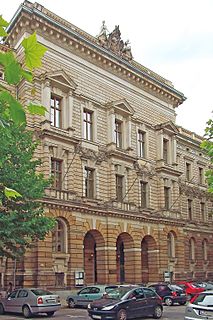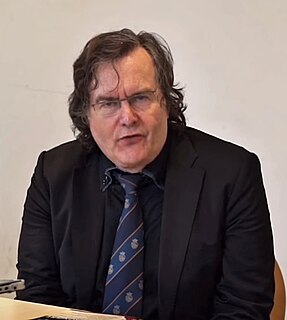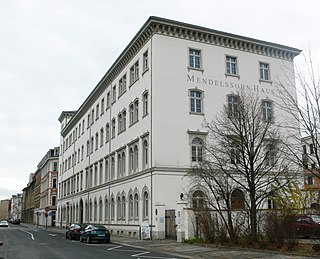The Felix Mendelssohn Bartholdy Foundation is a not-for-profit independent foundation governed according to civil law. It is based in the Mendelssohn House (where the composer lived in the 1840s) in Leipzig. [1] [2]
Contents

The Felix Mendelssohn Bartholdy Foundation is a not-for-profit independent foundation governed according to civil law. It is based in the Mendelssohn House (where the composer lived in the 1840s) in Leipzig. [1] [2]

Originally set up in 2003 as a fiduciary foundation, [1] the Mendelssohn Foundation's legal status was changed in 2012 by the Leipzig city authorities, here operating in partnership with the already registered "Mendelssohn House International Mendelssohn Foundation" ("Mendelssohn-Haus Internationale Mendelssohn Stiftung"). This was when the Felix Mendelssohn Bartholdy Foundation became a not-for-profit independent foundation, governed according to civil law. The constitution of the restructured foundation was drawn up on 28 November 2011, and the city's financial and legal participation was agreed at a council meeting on 18 July 2012. The Mendelssohn House and the Mendelssohn Museum, together with the museum site at Goldschmidtstraße 12, were brought into the foundation. Acceptance of the new arrangements by the German Foundations Supervisory authority followed on 28 August 2012. [3]
According to its constitution, The foundation objectives are focused, in particular, on international research and nurture concerning the artistic and societal inheritance bequeathed by the composer and director of the Gewandhaus Orchestra ("Gewandhauskapellmeister"), Felix Mendelssohn (1809–1847).
In addition, the foundation is required to encourage musical training and education in a manner consistent with the priorities of the composer who founded in Leipzig Germany's first music conservatory, which today bears his name as the University of Music and Theatre "Felix Mendelssohn Bartholdy" Leipzig.
The foundation is also to administer and operate the Mendelssohn Museum in the Mendelssohn House and the carriage house belonging to it. [4]
The first prize winner, in 2007, of the International Mendelssohn Prize in Leipzig was the conductor Kurt Masur, one of Mendelssohn's successors as chief conductor ("Gewandhauskapellmeister") of the Leipzig Gewandhaus Orchestra. Masur held the post for nearly thirty years. Masur has also played a leading part in the work of the foundation and of its predecessor entities: he was the foundation's president. [5]
The chairman of the supervisory board is Burkhard Jung, the lord mayor of Leipzig.

Kurt Masur was a German conductor. Called "one of the last old-style maestros", he directed many of the principal orchestras of his era. He had a long career as the Kapellmeister of the Leipzig Gewandhaus Orchestra, and also served as music director of the New York Philharmonic. He left many recordings of classical music played by major orchestras. Masur is also remembered for his actions to support peaceful demonstrations in the 1989 anti-government demonstrations in Leipzig; the protests were part of the events leading up to the fall of the Berlin wall.

The University of Music and Theatre "Felix Mendelssohn Bartholdy" Leipzig is a public university in Leipzig. Founded in 1843 by Felix Mendelssohn as the Conservatorium der Musik , it is the oldest university school of music in Germany.
Claus Peter Flor is a German conductor.

Gewandhaus is a concert hall in Leipzig, the home of the Leipzig Gewandhaus Orchestra. Today's hall is the third to bear this name; like the second, it is noted for its fine acoustics.
Psalm 42, Op. 42 "Wie der Hirsch schreit" is a work by Felix Mendelssohn, composed and published in 1837 for soloists, mixed choir and orchestra.

Reinhard Seehafer is a German conductor, pianist, composer of contemporary classical music and the founder and Artistic Director of the Festival Altmark Festspiele in Saxony Anhalt.

Georg Christoph Biller was a German choral conductor. He conducted the Thomanerchor as the sixteenth Thomaskantor since Johann Sebastian Bach from 1992 to 2015. He was also a baritone, an academic teacher, and a composer. Active as Thomaskantor after the German reunification, Biller returned the Thomanerchor to its original focus on church music. He was instrumental in the new buildings for the choir's boarding school, the Forum Thomanum, and in the celebration of its 800th anniversary in 2012.
The Mendelssohn Scholarship refers to two scholarships awarded in Germany and in the United Kingdom. Both commemorate the composer Felix Mendelssohn, and are awarded to promising young musicians to enable them to continue their development.

Mary Shaw was an English classical contralto who had an active international career in concerts and operas during the 1830s and 1840s. She is best remembered today for creating the role of Cuniza in the world premiere of Giuseppe Verdi's first opera Oberto at La Scala in 1839.

The Leipzig Gewandhaus Orchestra is a German symphony orchestra based in Leipzig, Germany. The orchestra is named after the concert hall in which it is based, the Gewandhaus. In addition to its concert duties, the orchestra also performs frequently in the Thomaskirche and as the official opera orchestra of the Leipzig Opera.

Gotthold Schwarz is a German Bass-baritone and conductor. Based in Leipzig, he started as a member of the Thomanerchor and has conducted the Gewandhausorchester. Between 2016 and 2021, he was the 17th Thomaskantor after Johann Sebastian Bach.

Matthias Eisenberg is a German concert organist and harpsichordist, and a cantor. The award-winning player is known for performing concerts with clarinetist Giora Feidman. He has performed and conducted master classes internationally. He recorded, including the complete organ works by J. S. Bach and improvisations, and has conducted Bach cantatas from the harpsichord in collaboration with the Thomanerchor.
Karl Ottomar Treibmann was a German composer and music educator. From 1981 until his retirement in 2001, he was professor of music theory and Tonsatz at the Leipzig University. He was one of the representatives of modernity in the German Democratic Republic, whose great major works can be found in the areas of opera, symphony and chamber music.
Reinhard Pfundt is a German pianist, composer and academic teacher at the University of Music and Theatre Leipzig. He wrote orchestral works, chamber music and songs, and was awarded prizes in the German Democratic Republic (DDR).

Mendelssohn House is a museum in Leipzig in Saxony, Germany. The composer Felix Mendelssohn lived here from 1845 until his death in 1847; it now contains a collection about the life and work of the composer.
Jürnjakob Timm is a German cellist and university lecturer. He played for over forty years in the Leipzig Gewandhaus Orchestra and the Gewandhaus Quartet.
Caspar Frantz is a German pianist and music educator.
Barbara Buntrock is a German violist and music educator.
Peter Lika is a German bass in opera and concert, focused on both oratorio singing as on historically informed performances.
Christian Kluttig is a German conductor, pianist and Hochschullehrer. From 1979 to 1990, he was chief conductor of the Orchester des Opernhauses Halle. Appointed General Music Director in 1983, he worked as such at the theatres in Halle (Saale) and Theater Koblenz. The Handel interpreter rendered special services to the implementation of Historically informed performance in the Saale city, which made him one of the most important protagonists in this field in the GDR. He also devoted himself to Neue Musik, premiering Reiner Bredemeyer's opera Candide.